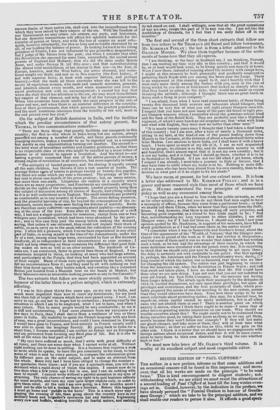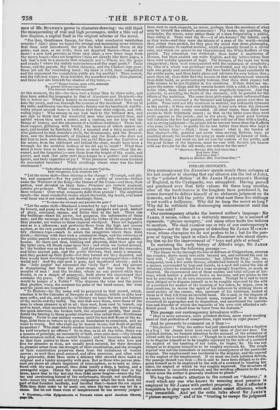SECOND EDITION OF "PAUL CLIFFORD."
THE author, in a new preface, informs us that some additions and an occasional erasure will be found in this impression ; and more- over, that all his works are made on the principle "to be read twice." This is kind encouragement to diligent students ; not- withstanding which, we are afraid we must resist the attractions of a second leading of Paul Cliffird at least till the long winter-even- ings set in. Guided, however, by the indication in the preface, we have already perused the "Funeral Oration in honour of Gentle- man George ;" which we take to be the principal addition, and we shall enable our readers to peruse it also. It affords a goad speO. men of Mr. BULWER'S power in character-drawing: we still think the masquerading of real and high personages, under a thin veil of low disguise, a capital fault in the original scheme of the novel.
"For thee, Gentleman George, for thee, what conclusive valediction remains ? Alas ! since we began the strange and mumming scene wherein first thou wert introduced, the grim foe hath knocked thrice at thy gates ; and now, as we write, thou art departed thence—thou art no more I a new lord presides in thine easy chair, a new voice rings from thy merry board—thou art forgotten I thou art already like these pages, a i
tale that s told to a memory that retaineth not !—Where are thy quips and cranks ? where thy stately coxcombries and thy regal gauds ? Thine house, and thy pagoda, thy Gothic chimney, and thy Chinese sign-post ; these yet ask the concluding hand : thy hand is cold, their completion and the enjoyment the completion yields are for another I Thou sowest, and thy follower reaps; thou buildest, thy succelsor holds ; thou plantest, and thine heir sits beneath the shadow of thy trees.;- -" Neque barum, quas colis, arborum Te, prmter invisas cupressos
• Ulla brevem dominum sequetur
At this moment, thy life—for thou wed a Great Man to thine order, and they have added thy biography to that of Abershaw and Shepherd—thy life is before us ! What a homily in its events I Gaily didst thou laugh into thy youth, and run through the courses of thy manhood. Wit sat at thy table, and Genius was thy comrade ; Beauty was thy handmaid, and Fri- volity played around thee—a buffoon that thou didst ridicule, and ridi- culing enjoy ! Who among us can look back to thy brilliant sera, and not sigh to think that the wonderful men who surrounded thee, and amidst. whom thou wert a centre, and a nucleus, are for him but the things of history, and the phantoms of a bodiless tradition ? Those bril- liantsuppers, glittering with beauty, the memory of which makes one -spot, (yet herited by Batchelor Bill,) a haunted and a fairy ground ; all who gathered to that Armida's circle, the Grammonts, and the Beauvil- liens, and the Rochfoucaults of England and the Road—who does not feel that to have seen these, though but as Gil Bias saw the festivities of his actors, from the sideboard and behind the chair, would have been a triumph for the earthlier feelings of his old age to recall ? What then must it have been to have seen them as thou didst see—(thou the de- ceased, and the forgotten!)—seen them from the height of thy youth, and power, and rank (for early wert thou keeper to a public) and reckless spirits, and lusty capacities of joy ? What pleasures where sense lavished its uncounted varieties ? What revellings where wine was the least excitement ?
" Inde alitur nudus placida sub matre Cupido, lade voluptates, inde alimenta Del."
"Let the scene shift—How stirring is the change *Triumph, and glit- ter, and conquest!—For thy public was a public of renown—thither came the Warriors of the Ring—the Heroes of the Cross—and thou, their -patron, wert elevated on their fame ; Principes pro victoria pugnant, ,comites pro principe. What visions sweep across us ! What glories didst thou witness ! Over what conquests didst thou preside I The mightiest epoch—the most wonderful events -which the world, thy world, ever knew ,--of these was it not indeed, and dazzlingly thine, " • To share the triumph and partake the gale ?'
" Let the scene shift—Manhood is touched by Age ; but lust is heeled' by luxury, and pomp is the heir of pleasure ; gewgaws and gaud, instead of glory, surround, rejoice, and flatter thee to the last. There rise thy buildings—there lie, secret, but gorgeous, the tabernacles of thine ease; and the earnings of thy friends, and the riches of the people whom they plunder, are waters to thine imperial whirlpool. Thou art lapped in ease as is a silkworm; and profusion flows from thy high and unseen asylum, as the rain poureth from a cloud. Much didst thou do to beau- tify chimney..tops—much to adorn the snuggeries where thou didst dwell ;—thieving with thee took a substantial shape, and the robberies of the public passed into a metempsychosis of mortar, and—became public- houses. So there and thus, building and planning, didst thou spin out thy latter yarn, till Death came upon thee ; and when we looked around, lo I thy brother was on thy hearth. And thy parasites, and thy comrades, and thine ancient pals, aod thy portly blowens, they made a murmur, and they packed up their goods—but they turned ere they departed, and they would have worshipped thy brother as they worshipped thee—but he would not And thy sign-post is gone, and mouldered already ; and to the Jolly Angler' has succeeded the 4Jolly Tar !' And thy picture is disappearing fast from the print-shops, and thy name from the mouths of men ! And thy brother, whom no one praised while thou livedst, is on a steeple of panegyric, built above the churchyard that contains thy grave. Oh! shifting and volatile hearts of men ! Who would be keeper of a Public ? Who dispense the wine and the juices that gladden, when, the moment the pulse of the hand ceases, the wine and the juices are forgotten ?
"To History—for thy name will be preserved in that record, which,
'whether it be the Calendar of Newgate or of Nations, telleth us alike how men suffer, and sin, and perish—to History we leave the sum and balance of thy merits and thy faults. The sins that were thine, were those of the man to whom pleasure is all in all : thou wert, from root to branch, sap and in heart, what moralists term the libertine ; hence, the light wooing, the quick desertion, the broken faith, the organized perfidy, that mani- fested thy bearing to those gentler creatures who called thee—Gentleman George. Never to one solitary woman, until the last dull flame of thy do- tage, didst thou so behave as to give no foundation to complaint, and no voice to wrong. But who shall say be honest to one, but laugh at perfidy to another? Who shall wholly confine treachery to one sex, if to that sex 'he hold treachery no offence ? So in thee, as in all thy tribe, there was a laxness of principle, an insincerity of faith, even unto men :—thy friends when occasion suited, thou couldst forsake ; and thy luxuries were dearer to thee than justice to those who supplied them. Men who love and live for pleasure as thou, are usually good-natured, for their devotion to pleasure arises from the strength of their constitution, and the strength of their constitution preserves them from the irritations of weaker nerves ; so wert thou good-natured, and often generous, and often with thy generosity, didst thou unite a delicacy that showed thou hadst an original and a tender sympathy with men. But as those who pursue plea- sure are above all others impatient of interruption, so toSuch as inter- fered with thy main pursuit, thou didst testify a deep, a lasting, and a revengeful anger. Hence the earlier gallants who rivalled thee in thy loves, know that to thy last day thou didst never forgive—hence thy bit. ter and unrelenting hatred of thy unfortunate, though not unoffending .wife—hence thy rash and arbitrary indignation when the mob took the part of that forsaken landlady, and Insulted thee I—hence the six unjust Billsthou didst order to be made out, when thytax.cart was hit by a stone. But let not these vices of temperament be too severely judged! - • IIneertaia,--vIde Eplgrarnalata et Poemata vetera spud Jaeobum Chouet, VIP DID- • thou wert in such respects, no worse, perhaps, than the members of whit may be termed the robber's aristocracy ! Thy tastes, thy qualities, thy principles, thy errors, were rather those of a man frequenting a public, than ruling it. Thou wert the H—d of ale-houses I thy talents, such as they were—and they were the talents of a man of the world—misled thee, rather than guided, for they gave thy mind that demi-philosophy, that indifference to exalted motives, which is generally found in a clever rake, and which we grieve to say characterized the Whig-Ruffiers of thy period. Thy education was wretched ; thou hadst a smattering of Horace, but thou couldst not write English, and thy letters betray that thou wert wofully ignorant of logic. The fineness of thy taste has been exaggerated ; thou wert unacquainted with the nobleness of simplicity; thy idea of a whole was grotesque and overloaded, and thy fancy in de- tails was gaudy and meretricious. But thou hadst thy hand constantly in the public purse, and thou hadst plans and advisers for ever before thee; more than all, thou didst find the houses in that neighbourhood wherein thou didst build, so preternaturally hideous, that thou didst require but little science to be less frightful in thy creations. If thou didst not im- prove thy native village and thy various homes with a solid, a lofty, and a noble state, thou didst nevertheless very singularly improve. And thy posterity, in avoiding the faults of thy masonry, will be grateful for the effects of thy ambition. The same derni-philosophy which influenced thee in private life, exercised a far benigner and happier power over,thee in public. Thou wert not idly vexatious in vestries, nor ordinarily tyrannic in thy parish ; if thou wert ever arbitrary, it was only when thy pleasure was checked, or thy vanity wounded. At other times, thou didst leave events to their legitimate course ; so that in thy latter years thou wert justly popular in thy parish ; and in thy grave, thy great good fortune will outshine thy few bad qualities, and men will say of thee with a kindly, nor an erring judgment-6 In private life he was not worse than the Ruffiers who came to his bar : in public life he was better than those who kept a public before him.' — Hark! those buzzes ! what is the burden of that chorus ?—Oh, grateful and never time-serving Britons, have ye modified already for another the song ye made solely in honour of Gen- tleman George ; and must we, lest we lose the custom of the public, and the good things of the taproom, must we roar with throats yet hoarse with our fervour for the old words, our ardour for the new ?
"'Here's to Mariner Bill, God bless him !
God bless him God bless him !
Here's to Mariner Bill, God bless him "



























 Previous page
Previous page